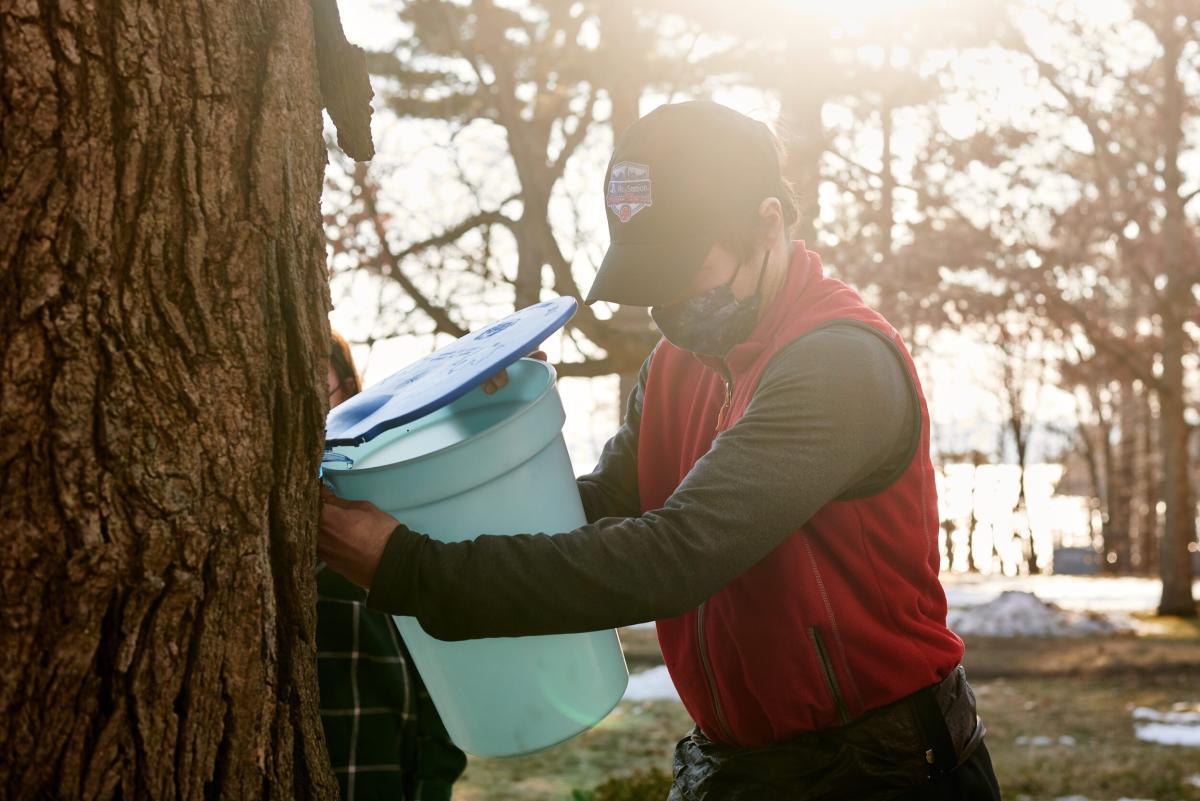
By Carolinne Griffin
Images by Bear Cieri
On a sunny afternoon in early March, a group of friends and community members gathered to partake in an old Vermont custom, albeit in a very unlikely place. Tapping trees and making maple syrup is common this time of year all across rural Vermont, but to find signs of sugaring in the urban wilds of Burlington? That’s different. This unconventional enterprise is the work of Tap O.N.E., (Tap Old North End), a newly formed collective of educators, foresters, and all-around good citizens who want to build community around one of Vermont’s oldest agricultural traditions.
Tap O.N.E. had started just weeks prior by a tight-knit group of friends who grew up in Vermont and now live in and around Burlington. “We all want to share the inspiration, the general happiness we get from being outdoors and learning about the resources and the land. That’s really the drive behind this entire project,” says Sage King, a Tap O.N.E. representative. When pandemic-weary folks were craving time together outside, in a safe way, the group thought it the perfect moment to launch the project. “This is all coming out of a need for the community to be involved in something, in a time where we kind of just need it,” says King. “Especially when the weather is getting nice.”
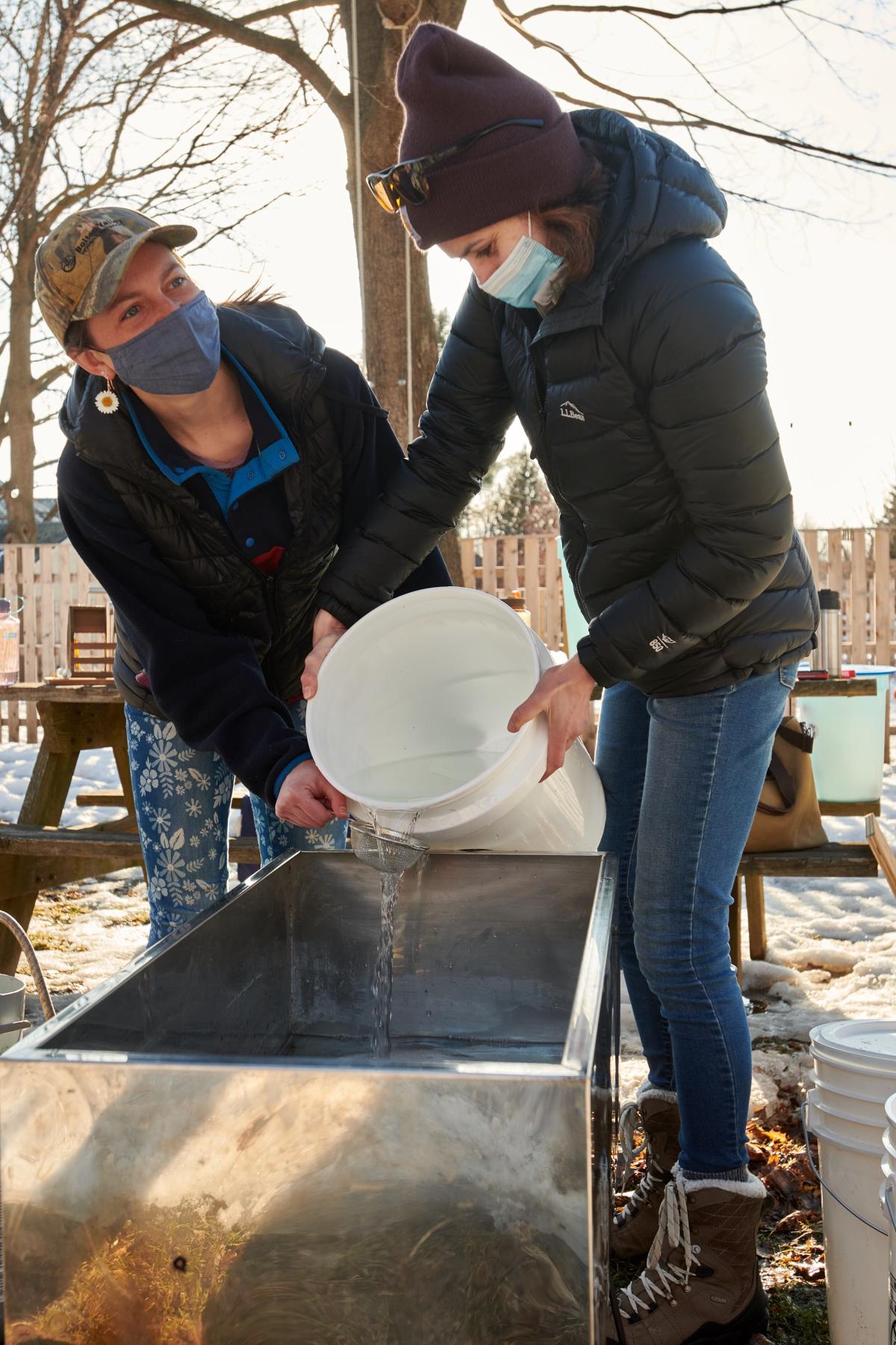
Sisters Maeve and Wynne Poleman, who are part of the Tap O.N.E. team and educators in the
Winooski school system, had access to a portable evaporator, sap buckets, and sugaring gear
through their father, Professor Walter Poleman. Professor Poleman, an ecologist and senior
lecturer at the Rubenstein School of Environment and Natural Resources at UVM, has done
extensive work around place-based education, an approach to teaching that uses the local
landscape, culture, and heritage as a foundation for learning. Professor Poleman is the one who
encouraged the group to create more engagement with the community through sugaring. “In a
lot of my work recently, I’ve been partnering with the City of Burlington on this idea of being
able to use the city as classroom,” he explains. “Sugaring just becomes an awesome
opportunity to build a culture-nature connection at any scale.”
With all the crucial equipment and a green light from the city to tap maples in designated parks and cemeteries, such as Lakeview Cemetery off North Ave., the Tap O.N.E. crew wasted no time getting the project off the ground. They devised a call-to-action for Burlington residents to join their efforts, created a barebones website, printed off 20 fliers with their logo (designed by Tap O.N.E. rep Max King) and posted them throughout the Old North End. Their outreach via social media channels has had the most success, though, particularly on Front Porch Forum and the Burlington Reddit page. In one video on Tap O.N.E.’s Instagram account, team member Will Dunkley of Westford Sugarworks gives folks a tutorial in the middle of Battery Park on how to identify maple trees. Here’s a clue: It’s all about opposing twigs. The group is looking to generate participation from more residents interested in either tapping maple trees on their own properties or at designated Tap O.N.E. sites, or by collecting sap and joining the group for one of their community boils. One visitor to their website wrote, “I don’t have a tree, but I want to learn!”
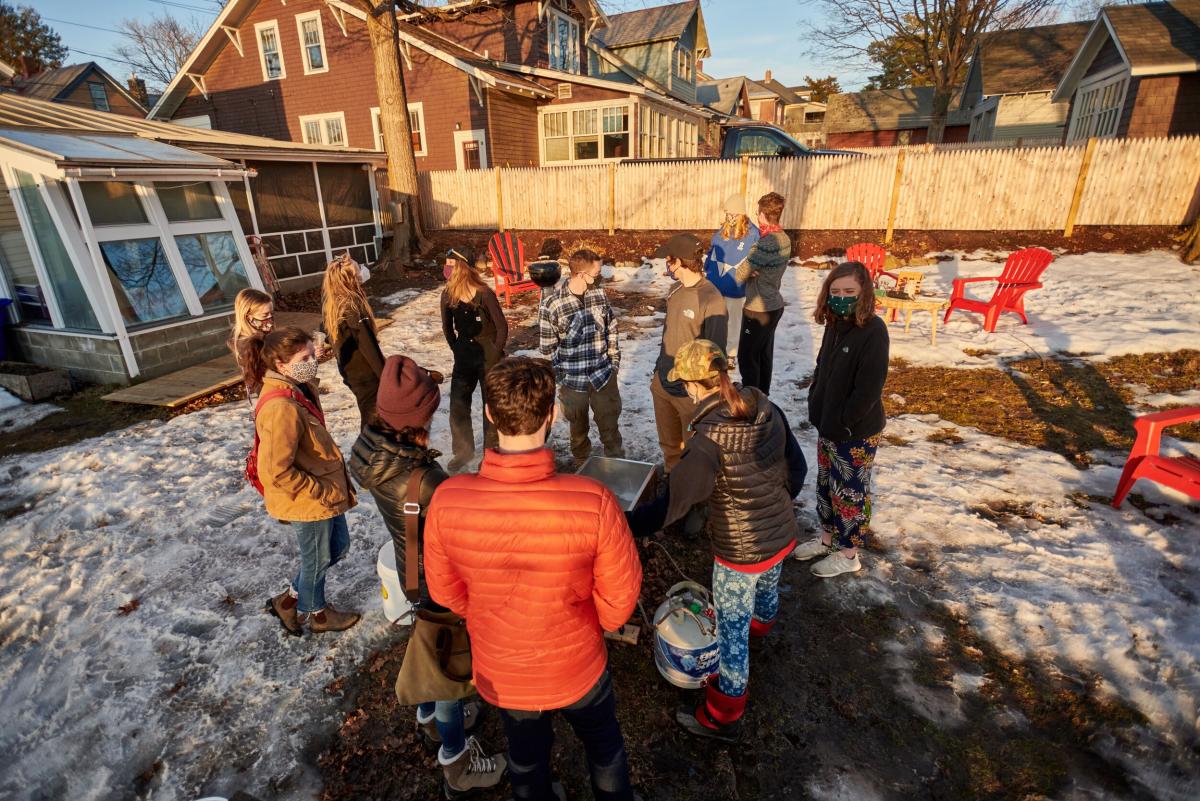
The inaugural Tap O.N.E. boil fell on Wednesday, March 10th, the first 50+ degree day of the season, bringing residents out of their homes to enjoy the rare temps. More than twenty people ambled into the spacious backyard on North Street to scope out the portable evaporator working its magic as it boiled down several gallons of fresh sap. The Poleman sisters, Maeve and Wynne, took the opportunity to educate visitors on maple sugaring tradition. “We are all on Abenaki land,” Maeve pointed out. “This is an Abenaki tradition.” Wynne demonstrated how to tap a tree to a couple of school-aged kids. She led with the question, “How can you tell if a tree is big enough to tap?” After a lull, she offered some practical wisdom. “Can you hug it?” The kids took turns putting their arms around the trunk. When they were unable to touch their fingers on the other side, Wynne gave the thumbs-up for tapping. With an old-fashioned brace and bit, they manually drilled a hole into the south-facing side of the tree, and within seconds the sap started to trickle down the bark.
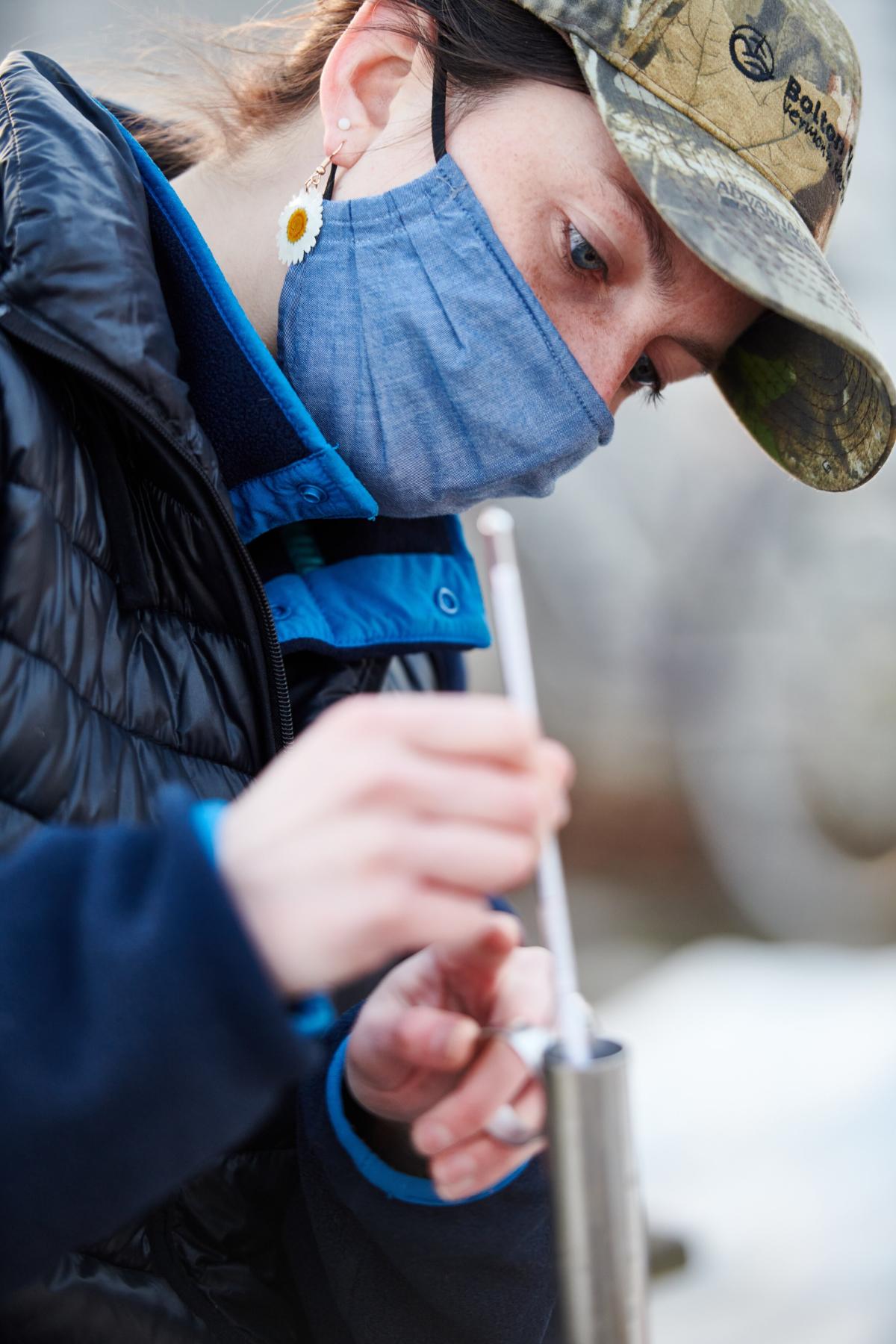
Prime conditions for sap flow happen in a very narrow four-to-six-week period in late winter,
when daytime temps are around 40-45 degrees Fahrenheit and nights are below freezing.
Warm days increase tree pressure, pushing the sap out, while cold nights cause the tree to pull
the sap back up, giving it a chance to recharge. This push-pull dynamic is what generates
optimal flow. Sap straight from the tree has a sugar content of just 3% and taste like cool water
with a hint of sweetness. To get to real maple syrup, the sugar content needs to reach 67% and
for that to happen, a whole lot of water needs to boil off. It takes a staggering 40 to 50 gallons
of sap to yield just one gallon of maple syrup.
Considering all the work that goes into producing the final product, it’s no wonder why maple syrup warrants a high price. But Tap O.N.E. is not out to make money from their efforts. Their main interest is to generate community engagement, and the syrup will go to the people who helped produce it. Down the line, when COVID restrictions ease, Tap O.N.E. hopes to collaborate with local organizations, such as the Boys and Girls Club of Burlington, and expand the possibilities of place-based learning for the community. “The Old North End is the most diverse part of Burlington,” notes Professor Poleman, “and there are many new families that have come in from different cultures, different places. This is an opportunity to get everybody to participate in something that’s a local tradition.” There are also discussions about selling the Tap O.N.E. maple syrup as a fundraiser in the future. For this season though, Tap O.N.E. is busy tapping, collecting, and bringing people together around the bubbling sap.
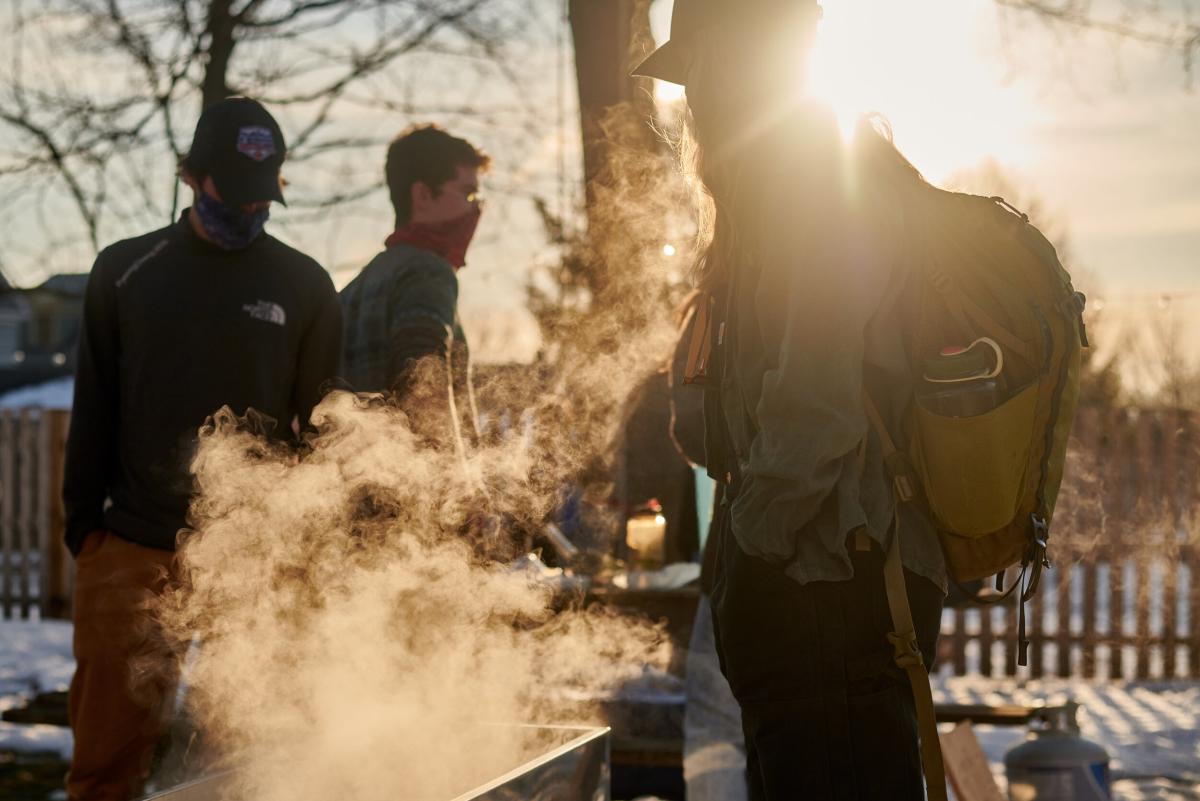
“So far, it’s been wicked fun to start,” says King. “With the number of people we reach each and every day, I’m sure it will take on new forms in the future. We’re only getting started.”


